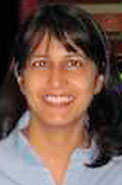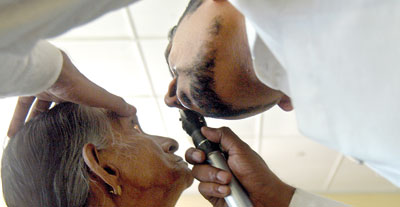Help out of the darkness
View(s):‘So Others May See Inc.’ holds eye clinics in all corners of the country providing low cost, custom-fit eye glasses for adults and children
By Kumudini Hettiarachchi
Can you spare Rs. 3,500?
This is what is needed to give sight to one of 100,000 people who is on the brink of blindness due to cataracts and just cannot afford to buy the lens themselves.
Cataract blindness — which is easily reversible with simple surgery and lens implantation — will lead them into darkness. Not only will they be disabled and unable to fend for themselves, they will also be a burden on family, society and the nation.
Saving cataract sufferers from blindness is the latest project of ‘So Others May See Inc.’ (SOMS) described as a unique “cross” between a Silicon Valley technical start-up and a non-profit organisation. It is a low overheads project where less than 10% is spent on administration and 90% on the people it serves.
Dispelling cataract blindness is not the sole target of SOMS though, for screening and providing brand new custom-fit eye glasses were its launching pad among the men, women and children in all corners of Sri Lanka.
It was just a few Saturdays ago (March 16 to be exact) that needy people gathered at the tiny church on Jawatte Road, Colombo 5 to get their eyes examined, while at other times it has been numerous remote areas. With stocks of reading glasses of different powers at hand, those needing them can take home a pair, while the eye-aid requirements of others with distant vision issues or special needs are met later.

Ashanthi
The beginnings of this empowering project were a request in December 2010 from the Lions Club to Ashanthi Mathai to help find old frames.
Being a chemical engineer and holding an MBA from the Stanford Graduate School of Business as well as having 15 solid years in health care strategy, the request for old frames got her thinking. With consulting and industry expertise in medical devices and supplies, pharmaceuticals, hospitals and healthcare systems, Ashanthi began researching the sphere of eye care in Sri Lanka.
What she unearthed was disturbing to say the least – the government and a few non-governmental organizations were struggling against major odds to meet the eye-care needs of a large number of people. There are 48 Eye Units and 85 Eye Specialists for 25 districts and a 20 million populace.
The “unmet need” left Ashanthi troubled. A huge 800,000 men, women and children (about 4% of the population) are suffering from moderate to severe visual impairment; a massive 3 million adults need reading glasses; and 1% of the population is blind from cataracts.
This is while a large number of Sri Lankans, about 50-60%, are living on less than Rs. 200 a day, according to the Census and Statistics Department. An eye-opener was that the minimum retail price of spectacles was anything between Rs. 4,000 to 6,000 and typically over Rs. 10,000.
People just could not afford to buy a pair of glasses and pathetically and stoically learned to live and manage without them. “Some of them had to give up their jobs, parents couldn’t help their children with homework and grandparents became unproductive,” explains Ashanthi.
Income was not the only barrier, but also access, with Ashanthi’s research uncovering a post-tsunami study in 2005 which had found that about 79% of people in the Northern and Eastern Provinces had never-ever had their eyes checked. It was then that she became determined to fill the lacuna by providing a low cost, quality, customized product that could be delivered to all parts of the country.
Even while attending to her duties as the wife of the International Monetary Fund’s Country Representative, Koshy Mathai, and mother of two young children, she got galvanized. There was no turning back.
Garnering the support of like-minded experts who had made a mark in their own fields, Ashanthi then set up SOMS. Earlier, the ‘Sight First’ programme of the Lions Club had been providing spectacles to the needy by getting used pairs from abroad. People would queue up, put them on, read a paper and take whatever they thought suited them. But Ashanthi revolutionized this system by getting optometrists to examine the people, give prescriptions and providing specs according to the prescriptions as well as the size of their faces, said Dr. Dulcie Serasinghe who heads the Sight First Programme.

A ‘close look’ at the Jawatte Road clinic. Pic by Nilan Maligaspe
“Ashanthi would even carry a little mirror for people to look at themselves when trying on the glasses,” Dr. Serasinghe said, recalling a programme in a temple in Beliatte. The Lions would spread the message about the eye clinic among the villagers and when they gathered at a certain spot on the required day, SOMS would do the needful. If it was a cataract or glaucoma, the patients would be referred to the Lions hospitals in Panadura, Kandana and Hambantota, where they are treated free of charge.
Adds the Coordinator of the Vision 20-20 Secretariat of the Health Ministry, Dr. Asela Abeydeera that SOMS has been part of the screening programme for schoolchildren in four of the 16 districts where it has been conducted, providing spectacles when necessary. It is also collaborating with the outreach eye clinics in remote villages.
With Ashanthi as Founder and Acting Chief Executive Officer of SOMS, the other experts in entrepreneurship, social entrepreneurship, networks and in for the long haul as Officers/Directors are Colombo Dockyard PLC’s Managing Director and CEO Mangala Yapa; Singer and National Development Bank Chairman Hemaka Amarasuriya; JB Securities MD and CEO Murtaza Jafferjee, International Finance Corporation’s Country Head Adam Sack; and Non-profit Sector Specialist Nilhan de Mel.
While all of them are giving of their time and commitment to SOMS on an honorary basis, Ashanthi has set up a small base, operating with three staff members including a doctor from a cubicle given generously by Ceylinco Life at Colombo 3.
Formally operational since May 2011, the SOMS’ record is commendable. Screening and examining 13,000 adults, SOMS has provided nearly 12,000 spectacles. In 2012, it has screened 230,000 schoolchildren in the Mannar, Kilinochchi and Mullaitivu districts in the Northern Province and the Matara district in the Southern Province and provided about 2,500 glasses while advising others on eye-exercises and “catching some serious issues” early and referring them to hospitals.
The spectacles are produced by Highray Enterprises, more or less at cost, as its contribution towards giving sight to people, says Proprietor Jayantha Abeygooneratne.
A pair of custom-fit spectacles gifted to each person costs just about Rs. 700, the lens being anything between Rs. 350-550 and the frame Rs. 350, handed over in a case that is Rs. 50 along with the lens-wiping cloth which is Rs. 5. For the popular foldable lens to be implanted in cataract surgery and also the disposables needed for the procedure the cost is Rs. 3,500.
Referring to the work being done by SOMS, Mr. Hemaka Amarasuriya is quick to point out that it’s not rocket science. He spells out the four principles on which SOMS works — the provision of high quality products and services, doubly important when giving a gift; cost-effective and customized products; solutions successfully integrated into the local system; and creation of community awareness and building consensus.
“We don’t take the dignity of people away from them by giving them a substandard product. We give something of value,” reiterates Mr. Mangala Yapa, while Ashanthi adds that a one-year warranty is given for the glasses along with follow-up care. There is a database to track all those benefiting from the programme while a hotline can be called if there is any issue with a pair of glasses, explains Ashanthi, stressing that SOMS does not wait until the people come to it but “we go to the people”.
And among the hundreds of letters of appreciation SOMS gets, the one treasured most is that “it is an extremely valuable priceless service”. This for something costing Rs. 700! Eye care at the grassroots is what SOMS is providing for all those falling below an income cut-off of Rs. 24,000 per month.
Give sight to another
As your mite will help give someone sight, please send your donations to Account No. 1108623501 at the Commercial Bank in the name of So Others May See Inc.
SOMS sets out on a broader mission
What of the future? Moving away from a myopic view, SOMS has a broader vision. We are hoping to launch a self-sustaining model, a social venture, says Ashanthi, dubbing it the SOMS ‘Silicon Valley model’.
This would entail a “taking from Peter to pay Paul” in a legal way and not dependent on charity alone, the Sunday Times understands. It envisages eye examinations and provision of custom-made glasses for Rs. 1,500 to low-income workers through employers who fully or partially subsidize the cost while channelling the extra Rs. 800 (as a pair costs only Rs. 700) or “gross profit” for the operation and expansion of the free service.
A leading blue-chip company has signed up for this “fee-for-service” programme for its 6,000 non-executive employees and their families, according to Ashanthi who urges other companies who have low-income factory workers, estate workers etc to support SOMS. While the employers would get better efficiency and also the goodwill of their employees, the “profits” would enable SOMS to bring light to the world of war widows, resettled people, orphans, labourers and domestic aids.
Follow @timesonlinelk
comments powered by Disqus
















